
The Angélique novels
By Anne and Serge Golon
I came of age with this series. They were the European equivalent of Gone with the Wind. The books were romantic extravaganzas about the epic exploits of the beautiful and indomitable Angélique—growing up in Louis XIV's France, moving from royal mistress to wife to New World pilgrim. Ravishing and ravished regularly, Angélique introduced me to sex, bodice ripping, history and the power of the blockbuster novel. My mother so disapproved that she tried to hide these books from me. If you have teenage daughters, make sure they are reading something equally shocking. That's how you know they're growing up. [Out of print]
By Anne and Serge Golon
I came of age with this series. They were the European equivalent of Gone with the Wind. The books were romantic extravaganzas about the epic exploits of the beautiful and indomitable Angélique—growing up in Louis XIV's France, moving from royal mistress to wife to New World pilgrim. Ravishing and ravished regularly, Angélique introduced me to sex, bodice ripping, history and the power of the blockbuster novel. My mother so disapproved that she tried to hide these books from me. If you have teenage daughters, make sure they are reading something equally shocking. That's how you know they're growing up. [Out of print]
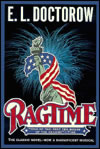
Ragtime
By E.L. Doctorow
'I want to wake up in a city that never sleeps,' sang Frank Sinatra. The book to match the song is E.L. Doctorow's fabulous fictional vision of New York at the turn of the century. Interweaving a host of different stories and characters, Doctorow creates a huge tapestry of the city. The beginning of movies, the wonder of the automobile, the crassness of wealth, the spirit of early feminism and the exuberant music of ragtime—it's all here. I read it just after my first-ever visit to New York and found its energy, like the city's, infectious and boundless.
By E.L. Doctorow
'I want to wake up in a city that never sleeps,' sang Frank Sinatra. The book to match the song is E.L. Doctorow's fabulous fictional vision of New York at the turn of the century. Interweaving a host of different stories and characters, Doctorow creates a huge tapestry of the city. The beginning of movies, the wonder of the automobile, the crassness of wealth, the spirit of early feminism and the exuberant music of ragtime—it's all here. I read it just after my first-ever visit to New York and found its energy, like the city's, infectious and boundless.
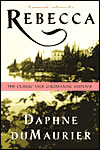
Rebecca
By Daphne Du Maurier
I learned my craft by writing thrillers, and du Maurier was one of my literary heroines. Every time I read her, I marvel at her skill. In terms of tension, plot, character, pace, revelation and denouement, she is a natural, and this story of a nameless second wife living under the spell of her more glamorous dead predecessor is a masterpiece. With its echoes of Jane Eyre and undertones of father-daughter Freudian obsession, Rebecca satisfies both your head and your heart.
By Daphne Du Maurier
I learned my craft by writing thrillers, and du Maurier was one of my literary heroines. Every time I read her, I marvel at her skill. In terms of tension, plot, character, pace, revelation and denouement, she is a natural, and this story of a nameless second wife living under the spell of her more glamorous dead predecessor is a masterpiece. With its echoes of Jane Eyre and undertones of father-daughter Freudian obsession, Rebecca satisfies both your head and your heart.
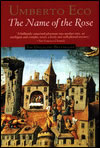
The Name of the Rose
By Umberto Eco
The story of a trail of murders in a godforsaken monastery in medieval Europe, this is the classiest whodunit ever written. Erudition, theology and scholarship are all words you don't expect to use when describing a crime thriller, but this one smashed the genre. It pulsates with atmosphere and the sense of a dark, bleak past, with the smell of burning flesh from the Inquisition all around. When all those blackened tongues and secret staircases finally lead through a labyrinth of books to the bibliophile's answer, you are not disappointed. I would die happy to have written this.
By Umberto Eco
The story of a trail of murders in a godforsaken monastery in medieval Europe, this is the classiest whodunit ever written. Erudition, theology and scholarship are all words you don't expect to use when describing a crime thriller, but this one smashed the genre. It pulsates with atmosphere and the sense of a dark, bleak past, with the smell of burning flesh from the Inquisition all around. When all those blackened tongues and secret staircases finally lead through a labyrinth of books to the bibliophile's answer, you are not disappointed. I would die happy to have written this.
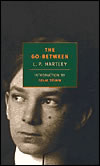
The Go-Between
By L.P. Hartley
Sometimes life delivers you the right book at the right time. Set at the height of a lusciously hot Edwardian English summer—and there's nothing like an English summer because it is so precious and so short—The Go-Between is the story of a young boy on the cusp of puberty who is drawn into an adult love affair while still too young to understand grown-up emotions. Passion, betrayal, longing, loss—this is life as a set of exposed nerve endings. I read the book in a cottage in Devon one brief, hot summer after a lost love affair. Together, the sun and the words healed me.
By L.P. Hartley
Sometimes life delivers you the right book at the right time. Set at the height of a lusciously hot Edwardian English summer—and there's nothing like an English summer because it is so precious and so short—The Go-Between is the story of a young boy on the cusp of puberty who is drawn into an adult love affair while still too young to understand grown-up emotions. Passion, betrayal, longing, loss—this is life as a set of exposed nerve endings. I read the book in a cottage in Devon one brief, hot summer after a lost love affair. Together, the sun and the words healed me.
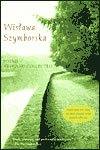
Poems New and Collected 1957–1997
By Wislawa Szymborska
Everyone should have a mantra to help them through the dark times, and the poems of this Nobel Prize–winning Polish woman are the nearest I have come to a passport to the light. Her poem "Four A.M." has comforted and warmed me during some very shaky moments in my life.
"The hour when the earth takes back its warm embrace.
The hour of cool drafts from extinguished stars.
The hour of do–we–vanish–too–without–a–trace."
Szymborska's vision of the tenderness, intensity and fragility of the world and the elegant simplicity with which she describes it just take my breath away. On a desert island, if I were allowed only one book, I think this would have to be it.
By Wislawa Szymborska
Everyone should have a mantra to help them through the dark times, and the poems of this Nobel Prize–winning Polish woman are the nearest I have come to a passport to the light. Her poem "Four A.M." has comforted and warmed me during some very shaky moments in my life.
"The hour when the earth takes back its warm embrace.
The hour of cool drafts from extinguished stars.
The hour of do–we–vanish–too–without–a–trace."
Szymborska's vision of the tenderness, intensity and fragility of the world and the elegant simplicity with which she describes it just take my breath away. On a desert island, if I were allowed only one book, I think this would have to be it.




